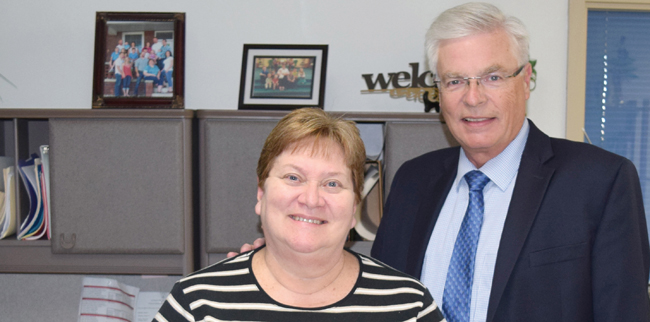This summer, the Diocese of Belleville’s longtime Director of Education, Tom Posnanski will retire after 40 years.
Posnanski, 72, has been on the cutting edge of Catholic education since 1969, when he was hired as a junior high school teacher. Since 1978, he has worked for the Diocese of Belleville. He became Diocesan Director of Education in 1982, succeeding Msgr. William Hitpas. I was very fortunate that Msgr. Hitpas was such a wonderful and wise mentor and blessed that he hired me.
Throughout his tenure, Posnanski has overseen just about every aspect of diocesan education, including the elementary schools and high schools, parish religious education programs, adult education, leadership training, school board and parish council training, strategic planning/consolidation, school funding, parent involvement, parent education, and enrollment management. He has assisted in the design coach certification programs, family education, marriage and family programs, and he has been responsible for the department’s financial management.
Needless to say, education has changed quite a bit since Tom Posnanski first walked into a classroom during the Nixon Administration. And most of those changes have been fairly recent.
}“Between the time I went to school and the time I started teaching very little changed,” Posnanski said. “Then education exploded, especially over the last twenty years. Technologies and methodologies especially have changed. Instructors used to teach everyone at the same pace. Now teaching is more individualized, more differentiated, and teachers are more creative in how they instruct students.”
Posnanski said today’s younger teachers grew up with personal computers and smart phones and are thus much more comfortable with the latest electronic devices. “It’s second nature to them. And properly used, technology is an outstanding tool. We’ve gone from passively watching filmstrips and lectures to interactive technologies which really engage the students. It’s the future.” The quality and excellence of our Catholic School teachers is stronger than ever.
According to the outgoing director, the state of Catholic education in the diocese is strong, but the biggest challenge remains basic economic realties. It’s not that the Catholics of the diocese cannot afford Catholic schools, but that schools in some rural areas are limited by the number of students available. “That’s the biggest factor in keeping schools viable,” he said.
This is despite the influx of Hispanic students in areas like Carbondale/Cobden or Clinton County. “Unfortunately many Hispanic children attend public schools,” he said. In part, this is due to the fact that in Mexico and Central America, Catholic schools are thought of as for the wealthy. “So Catholic education was often not part of their lived family experience,” he said.
Posnanski said he has been fortunate to work with five excellent bishops who have been far-sighted and supportive of strategic planning and Catholic Education. Because of that, he believes, he is leaving the schools in good financial and organizational shape. Bishop Braxton has committed to visit every school in the Diocese which no other Bishop was able to accomplish. There is a total of $20 million raised in endowments for individual schools in the Diocese, which is a great advantage to his successor and the future of those schools.
Asked what advice he has for his successor, Posnanski said the challenge will be to keep the schools as strong as they possibly can be and parish religious education programs be as effective as they can possibly be. “We can’t be satisfied. We must always look to improve and make a real difference in the life of our youth.”
Posnanski maintains that Catholic Schools, done right, with qualified teachers and quality programs, are priceless. They do have a place in southern Illinois and will be very important for the future of the Diocese. Indeed, the transformation of diocesan schools during his tenure has been tremendous, he said. “Expectations are higher these days. Families expect their children to get into the best colleges and be taught in a faith filled environment .”
This is, he said, in part due to Catholic families having fewer children. “When families used to have eight or nine kids the priorities were different and times were different,” he said.
He also advises his successor to make sure the schools maintain a Catholic identity and improve how the Catholic Church engages students and families in their faith.
After some brief time off, Posnanski said he will devote himself more fully to his wife of 47 years, Mary Anne, and his five sons and eight grandchildren. “I want to be more a part or their lives and attend more of their activities,” he said.
Posnanski, who received a Bachelor of Arts Degree from St. Francis Seminary, Milwaukee, Wisconsin and a Masters of Science in Education from Southern Illinois University, is also a licensed marriage and family therapist, so he hopes to do more marriage and family therapy, as well.
In a statement announcing Posnanski’s retirement, Bishop Edward K. Braxton called Posnanski a dedicated and loyal employee who has worked diligently with teachers and principals and those involved in faith formation to help young people to learn their faith, love their faith, and live their faith.
“His commitment to excellence in Catholic education has guided him in the work of molding our children for the future, giving them the foundation to live Christ-centered lives,” the Bishop said. “Mr. Posnanski has tirelessly supported our school principals and pastors in promoting and maintaining Catholic identity, a strong academic curriculum, and strategic vision. In recent years, he has provided important assistance to [the Bishop] for the evaluation of our Catholic schools as a part of The Pastoral Plan for Parish Renewal and Restructuring.”
“The faith life of the people of this diocese is awe inspiring,” Posnanski said. “That’s been the joy for me being with the people of the Diocese of Belleville.”
Posnanski’s last day is July 31.







